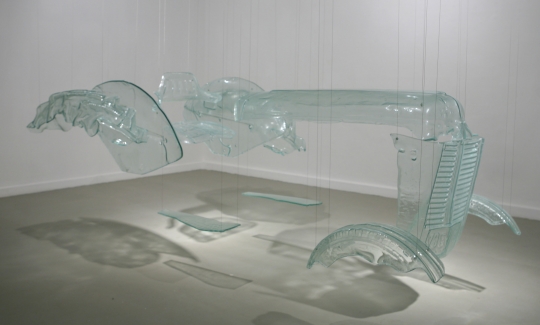Curator: Tal Yahas
The transparent parts of a Massey Ferguson tractor are suspended from the ceiling at the center of this exhibition space. Cast in glass, these delicate and fragile forms outline the massive vehicle's absent body. For Noah Hagiladi, this tractor is imbued with memories of growing up on a moshav, and with the pioneering ideals on which she was raised. More than anything, it encapsulates the memory of her father - a farmer and flower expert who passed away last year after a long illness. This is her father's tractor, and the installation - which he did not live to see in its entirety - was created in homage to him and to his world.
"My father was a special man, who believed in bygone ideals: a pioneering spirit, a strong connection to the land and a commitment to agricultural work," the artist comments. "These were the ideals he imbibed from his parents, who immigrated to Israel in the early 1920s, and which shaped his education at the agricultural school Kaduri. For me, this tractor symbolizes power and a strong connection to the land. Working the land, which was the dream of every adolescent who was raised on the myth of the sabra, is now largely consigned to Thai workers.
My father's generation is growing older, and the citrus groves that once covered the country are being chopped down to make way for shopping centers."
The image of the glass tractor is filled with a kind of wondrous beauty. Yet unlike the social realist imagery adopted by painters during the early years of Israeli independence, it no longer constitutes an ode to the vision of redeeming the land. Sixty years later, the image of the tractor has been transformed into a private elegy for a world that is irrevocably lost. Hagiladi's work is concerned with the dissolution and extinction of the same Zionist-agricultural myth glorified by social realism. Removed from the agricultural sphere into the closed space of the
museum, and dismantled into fragile and transparent units, this massive vehicle - now stripped of its function and uprooted from the earth - becomes a kind of ghostly, absentee presence. The tractor is thus transformed into a metaphor for the gradual dissolution of warm childhood memories, for lost social ideals and above all for the artist's father, whose stout body grew increasingly weak before his deat

